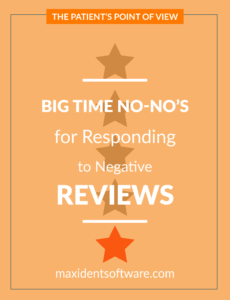
Welcome back to my ongoing series and I hope you’re ready to take off your Dentist’s cap, you know the one that specifically states in bright bold letters across the front “I am a trained Dental Professional.” It is very important for this particular post that you take on the role of the patient. Why? Because we are going to be discussing a very important facet of all businesses: Reviews. Specifically, negative reviews. Keep the cap close, however, because you will need it at least once on this journey.
Right now, I want you to think about your absolute worst dental experience and, without naming names, pull out a piece of paper or grab your laptop and start writing. If you don’t have the time for this, that’s okay, just take a minute to think about what you might say and the feelings involved. Be honest.
After you’ve finished, take a look at what you’ve written. Now is the time to pick up your Dental Professional’s cap and put it back on. You need to look at your review, not as a patient, but as a dental professional who has just come across it on a review site or on your own website.
How might you approach a review like that one? How would you respond? What is the first thing that comes to your mind? Don’t write it down. Not yet. Even if your fingers are itching to respond, breathe easy. In fact, take your cap off, because this initial reaction is what I’m going to discuss in this blog post. My research on this subject suggests that some dental professionals are going about these types of reviews all the wrong way. As a patient, how do you expect a dental professional to respond to your negative review? Well, here are just a few examples of how some dental professionals have been handling their own negative reviews:
“Manhattan dentist sues five patients in four years over negative web reviews.”
“Patient who posted bad review of dentist on Yelp sued for £125,000 . . .”
“Doctors fire back at bad Yelp reviews – and reveal patients’ information online.”
So, in a nutshell, we have two lawsuits and exposure of patients’ information as a rebuttal to negative reviews. If you think I’ve made these up, that nobody would ever do something like this, I’ve posted the links under the resources section of this post for you to read in their entirety. It’s unfortunate, but it’s true. I know some people think any publicity, even bad publicity, is good publicity, but it really isn’t. Being known as someone patients can’t trust or even someone they fear will only bring the practice down as one of the main things to establish is a good doctor-patient relationship, the cornerstone of that being trust. How can I or you or anyone else trust a dental professional who attacks negative reviews with unrealistic lawsuits or exposing patients’ medical information? I have said this before and I’ll say it again, you absolutely cannot control a person’s feelings or reaction, you can only control your own, and if you willingly fight fire with fire, you will most definitely get burned. And judging by the critical media response to these attacks on patients, these dental professionals did, in fact, feel the flames.
I’d like to point out that not all negative responses are this extreme, but it’s important that all negative responses should be curbed for the continued success of your dental practice. Have you ever written a negative review of a business? This can include filling out comment cards too. How did that business respond? If it was positive, great! But how would you feel if the response was negative? Would you go back? Would you trust them ever again? I have read a number of negative reviews in researching for this post, but it is always the responses to those reviews that I paid attention to. It really is all about how the business owner responds, how they react, and what they intend to do to make things right. Here are just a few of the No-No responses I sincerely hope you avoid:
Deleting
If you have a place on your website to leave reviews, you have to expect that not all the reviews will be good or fair. However, it is not good practice to delete those negative reviews. Deleting means you don’t care. This is not the kind of impression you want to give to any of your patients. Standing in the shoes of your patients, how would you feel if your dental professional deleted your review? The fact of the matter is that everything we do or don’t do tends to spread throughout the community, potentially losing you that patient as well as potential patients they might have brought with them.
Changing or editing
If you have the ability to change or edit a negative review (even just for spelling or grammar errors), resist the urge. There is nothing worse for someone than seeing a doctored version of their review online. If they already think you don’t care about their health and well-being, whitewashing a review will quickly validate that theory. The National Post article points out another downside: “If you whitewash comments, if you only put those that are highly positive, the public is very savvy and will consider that to be only advertising.” Sure, positive reviews help and can be considered part of your marketing strategy, but the last thing you want your patients to think when they write a review is that you are using them as a form of advertising only.
Attacking
Again, this is a form of fighting fire with fire. Attacking doesn’t necessarily mean a lawsuit. And just in case you’re wondering, lawsuits “attract a torrent of attention” though mainly the unwanted kind and score “few, if any, legal successes.” But beyond that, sometimes, an attack can rest all on the words with which you respond. In all honesty, your response means a lot more to your existing and prospective patients than does the review of the angry patient. Why? Because anything you say reflects not just on you but on your practice and the rest of your team. Patients are going to look at this negative response and decide it just isn’t worth it to trust your practice.
Punishing
Customer service isn’t always going to be sunshine and roses. And it is important to note that no two people are alike. Just like you are going to enjoy good customer experiences, you are also going to run into bad ones. I have worked in customer service for almost two decades and I have probably seen it all, but I think the most interesting thing I saw was in a small shop in Vancouver and how they “handled” grouchy customers. They used punishment in the form of a “Crabby jar” in which they expected their customers to drop 5-10 dollars into the jar if they were difficult. I had to ask if this worked so I did. The answer at once surprised me. The two people currently working behind the counter at the time both chimed “yes!” in unison. They explained that customers who looked at the jar immediately decided to check their attitudes. Okay, you’re probably thinking, this doesn’t sound like a no-no idea, but when you apply punishment to negative online reviews, you get an entirely different and not so appealing result. As an example, time.com cites a hotel’s attempt to make money by punishing negative reviews by threatening to charge $500.
The customer response is I’m sure not what they were hoping for. They received thousands of angry comments and “the hotel’s Yelp page now lists the property as closed, and its number had been disconnected.” Rather than punishing their customers and enjoying a financial gain, they punished their own business and now suffer a huge loss.
Conclusion
With this part of our journey at an end, It is important to understand just how beneficial it is to your practice to maintain a good relationship with your patients. This requires keeping your foundation intact, and avoiding these four very dangerous responses to negative reviews– deleting, changing or editing, attacking, and punishing. Protect your patients and your practice with a positive response as responding negatively will only guarantee a negative result.
Time to respond
Now is your chance to respond to your own patient review. You can share your response with us or you can just keep it to yourself. Again, if time is a factor, just think about your response and what strategy you might use. On Tuesday, following the long weekend, I implore you to join me here. I will look at different types of positive responses, and I will focus on the steps all dental professionals should take to get to that positive response, benefiting not just that patient, but at the same time their team and their practice.
Resources
- http://www.nydailynews.com/new-york/manhattan/manhattan-dentist-sues-5-patients-4-years-bad-reviews-article-1.2726895
- http://www.dailymail.co.uk/news/article-2934801/Patient-posted-bad-review-dentist-Yelp-sued-125-000-practice-legal-slammed-poor-substitute-customer-service.html
- http://news.nationalpost.com/health/doctors-fire-back-at-bad-yelp-reviews-and-reveal-patients-information-online
- http://time.com/money/4426383/dentist-sues-patients-online-reviews/
Suggested Page:



